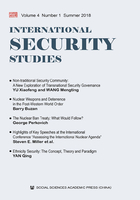
1 Introduction
This paper takes seriously the idea that we are heading into a post-Western world order. It has two aims: first to sketch out very briefly some of the key features of the emerging post-Western world order and second, on that basis to try to think through the likely roles and purposes of nuclear weapons within that emergent framing. The first part is based on an ongoing project to think about the post-Western world order. The second part builds on the understanding of nuclear issues set out in survey of thinking about nuclear weapons and deterrence during the evolution of International Security Studies.
The second part builds on the understanding of nuclear issues set out in survey of thinking about nuclear weapons and deterrence during the evolution of International Security Studies. Most of the concepts and concerns about nuclear weapons and deterrence remain relevant, and the aim is to think through how they will play in the more decentred, regionalised world order into which we seem to be moving.
Most of the concepts and concerns about nuclear weapons and deterrence remain relevant, and the aim is to think through how they will play in the more decentred, regionalised world order into which we seem to be moving.
This is necessarily a highly speculative exercise. Not all will agree with the way in which I set out the likely form of the post-Western world order, and for those that don't, that will render some of my speculations about nuclear weapons and deterrence no more than an abstract scenario covering one possible future. What this exercise lacks in scientific rigour, it perhaps compensates for in providing both an overview of the key issues, and a systematic basis for discussion. The future we face is in many respects unknowable, but well-constructed scenarios are one way of probing the possibilities. The next section sets out some assumptions about the likely structure of the post-Western world order. In the light of this scenario, the following section considers seven key issues for thinking about nuclear weapons and deterrence: technology, status, proliferation, deterrence logic, arms control, war and the nuclear taboo. The conclusions consider the implications, and set the issue of nuclear weapons into the wider context of other threats to the existence of humankind. This exercise assumes that no game-changing wild cards will emerge from the card deck of international relations during the next two or three decades: i.e. no big and sudden climate change, no large-scale nuclear war, no global plague, no massive collapse of the global economy or infrastructure, and suchlike.